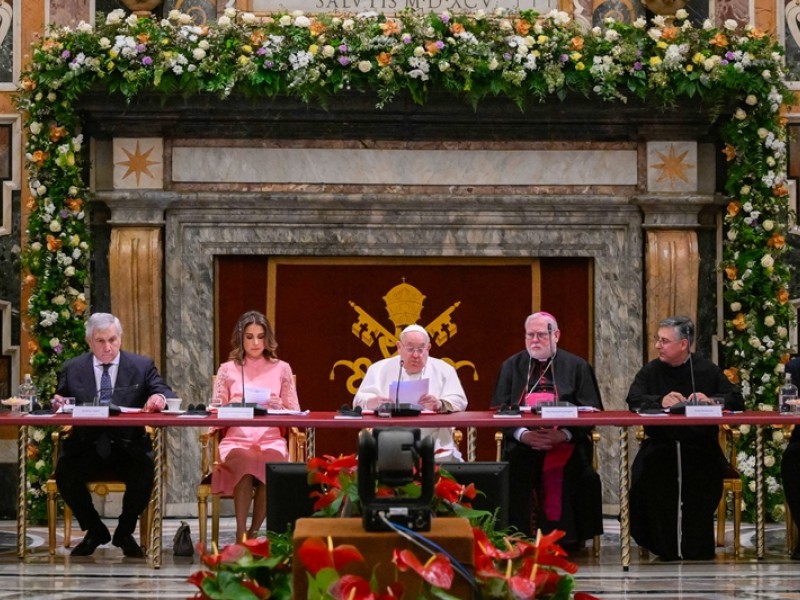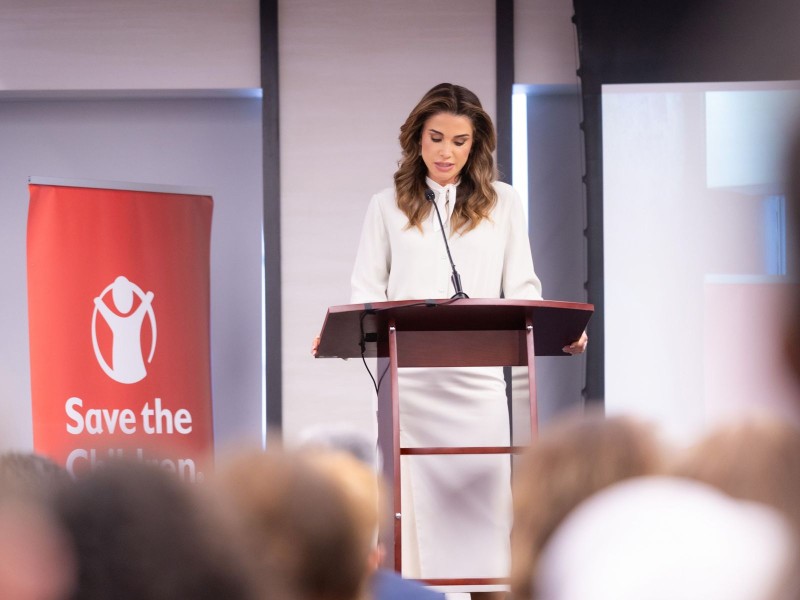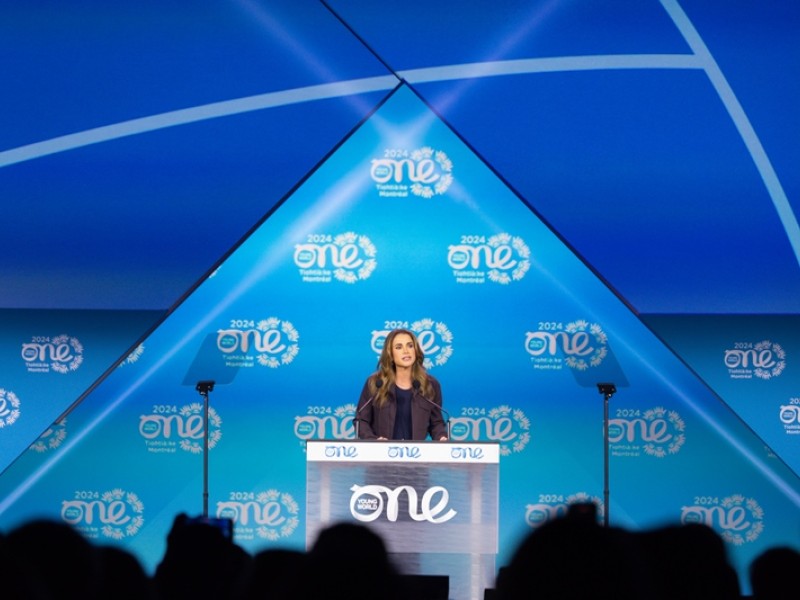Queen Rania’s Speech at Web Summit Qatar - Doha, Qatar
Bismillah ar-Rahman ar-Rahim,
Thank you, Katherine. I am grateful to be here in Doha with all of you today.
One of the most fascinating things about technology is its ability to reveal human nature. The way we interact with our devices tells us a lot about ourselves.
We are, by nature, storytellers; it’s how we make sense of the world. Every selfie, status update, photo, and video we share adds a few more lines to the story that we are constantly writing, and rewriting, about ourselves.
We publish moments of our lives to our social media pages, never quite knowing how they will be received. Will we be praised? Judged?
Or, worst of all, will we be ignored?
Because, for a social species like ours, invisibility is akin to death. How can anyone feel they belong in a world where their story fades into the background?
For decades, one people’s story has been obscured… relegated to a footnote in a narrative authored by someone else. It is the story of Palestine, whose people have been pushed to the periphery, just out of sight – and out of mind.
For too long, Palestinians have been dehumanized and discredited… turned into a people unto whom anything can be done, without consequence.
Their status as an occupied people is glossed over. Their diverse population of doctors, educators, and activists is disregarded. Their many attempts at non-violent resistance – from historic strikes and civil disobedience, to Gaza’s Great March of Return – have been crushed, even criminalized.
Instead, Palestinians are reduced to antagonists in someone else’s story: They are cast as terrorists and security threats, nothing more.
Yet, today, for all the cruelest reasons, Palestinians have come into the world’s field of vision with sharper focus. And, three-quarters of a century since the Palestinian-Israeli conflict began, millions around the world are getting their first glimpse at what it means to be a Palestinian today.
In the wake of the war on Gaza, many of us have seen our social media landscapes redrawn. The colorful feeds on our phones have given way to monochrome: white shrouds, grey rubble, and black-and-white screens warning of “sensitive content” ahead.
I sometimes hesitate to reveal what is behind the warning screen. Because, after more than 140 days of war, I know what awaits: a harrowing snapshot of life and death in what has become the most miserable place on Earth.
Babies covered in searing burns… Children with bloody bandages where limbs should be… Mothers peeling back shrouds to kiss angelic faces goodbye…
Scrolling through these images of a merciless war, I find myself thinking, “It can’t get any worse.” And then, it does.
The bar for humanity keeps falling to new lows.
Actions that were once unthinkable are now commonplace: Hospitals under fire. Houses of worship destroyed. Civilians killed with white flags in hand.
How can we possibly make sense of that?
The fact is, when one side of a conflict has been robbed of the right to tell its story, we’re left with an incomplete narrative.
The current iteration opens like this: “The war began on October 7th.”
To be sure, the brutal October 7th attack opened a new and devastating chapter in the saga. But the larger story has been unfolding for more than most of our lives: 75 years in which Palestinians have not known a single day of genuine peace.
Acts of war are not always as clear-cut as an airstrike, an ambush, or an abduction.
Sometimes, violence takes the form of a crippling 17-year blockade… as decades of almost daily deaths. It appears as checkpoints, a separation wall, armed settler violence, detentions without charge, and the endless indignities of life under occupation.
At The Hague last month, while presenting Israel’s defense against the charge of genocide, a member of its legal team argued that the historical context of the conflict was irrelevant… because, for him, October 7th was context enough.
That’s the trouble with so-called cycles of violence: no one can agree on where to start the story. Each side instinctively centers the suffering of their own people and minimizes the other—a posture enabled by digital echo chambers that reassure us that our opinion is the only credible one.
The historical story of Israel is centered on World War II, the Holocaust, and the Jewish people’s desire for a homeland.
Yet, this account has overshadowed the Palestinian story: the Balfour Declaration, the ethnic cleansing of the Nakba, and the decades of displacement, dispossession, and illegal military occupation that have followed… and continue to this day.
The echo chambers in our minds are hardwired to dismiss anything that doesn’t confirm our convictions. Yet, the war in Gaza, livestreamed to the world, has brought into full view the power imbalance that has dictated the story of this conflict.
Many in the West have been left with an uneasy sense that the Palestinian issue isn’t as black-and-white as they had been led to believe… that they didn’t have the whole story.
It’s uncomfortable to challenge long-held beliefs. But beyond the comfort zone of the familiar lies the opportunity to understand, connect, and grow.
One can acknowledge that, for many, Israel’s founding countered a historical injustice – while recognizing that it created another that has yet to be resolved. You can condemn the killing of Israeli civilians, while affirming that absolutely nothing could ever justify the annihilation of Gaza and its people.
But many who have expressed these sentiments have faced a backlash – as if it’s a crime to place equal worth on Palestinian and Israeli lives… As if Palestinians exist outside the limits of our humanity.
Yet, just as stories can dehumanize, they can also empower. They can help us see our own humanity reflected in another’s eyes.
Over the past few months, many Gazans have been thrust into roles they never asked for: photographers and content creators, turned war correspondents… reluctant spokespeople for Palestinian suffering and strength.
For those living half a world away from Gaza, it can be difficult to relate to a faceless people under attack. But that distance falls away when scrolling through the Instagram grid of a cheeky, teenage boy in northern Gaza.
His sense of humor may remind you of your son, your little brother... yourself. Yet, he is joking at the irony of surviving months of shelling only to potentially starve to death.
Another brave young woman shares updates from a sea of tents in Rafah. When the lack of clean water forced her to cut her curly hair, activists across the world cut off a lock of their own in support.
This is, at once, a tragic and a transformational moment for the people of Palestine. Just as their lives are crumbling around them, people everywhere are connecting with them.
From London to Madrid, D.C. to Dublin, people are mobilizing for Palestine in unprecedented numbers. Jewish activists around the world have been some of the loudest voices calling for a ceasefire. Murals of Gazan bloggers have appeared on European streets.
This new generation of citizen journalists is being credited with “humanizing” the people of Gaza.
The tragedy is Palestinians have been human all along – it had just been simpler to believe otherwise.
Today, the visibility of Palestinians is dependent on their devices – but also on decisions made worlds away, in office buildings and corporate headquarters.
Many Palestinians and advocates have said they believe major platforms are limiting their reach. Some have had their accounts suspended or deleted after speaking up on what the International Court of Justice has deemed a “plausible” genocide.
It can be nearly impossible to prove that you have been shadow-banned or censored. Yet, it is hard for users to trust platforms that control their content from the shadows, based on vague standards.
Online and offline, blurred standards have never worked for Palestinians’ advantage. Just look at global benchmarks of human rights… international law… universal values of equality and justice… Some of our most basic principles are being rewritten in real-time, to rationalize an irrational level of violence.
Why is the killing of some condemned, while the killing of others justified? Why is depriving one child of food a crime, but starving one million Gazan children an acceptable outcome of war?
These questions are echoing across the world, creating an unmistakable shift in global perceptions.
But what’s the point of changing minds without changing reality?
Lately, I’ve been reflecting on the power and limitations of solidarity.
The people of Gaza have never been more connected – yet never more isolated. Cut off from food, water, medicine, fuel, and everything required to sustain human life, they have continued to reach for their phones… to reach for us.
Palestinians have long dreamt of telling their story to the world. Today, they are being heard, loud and clear…but at what cost?
It has taken their mass killing to garner mass support.
Why must Palestinians audition for their humanity?
Why must some fight tooth and nail for compassion, while others are given it freely?
What does it matter if millions of people believe you have been wronged… if the injustice continues?
My feelings on social media activism have always been mixed. Can a TikTok takeover or trending hashtag really make a difference? Are we elevating the stories of the oppressed, or providing ourselves with an easy out?
I have no simple answers. If anything, I become less sure each time I pick up my phone.
Because, every browsing session is an exercise in digital whiplash – a little girl’s mutilated body dangling from the ruins of a building hit by an Israeli missile… followed by a Japanese man taking to the streets alone each day to demonstrate in solidarity with Gaza. Hungry children wandering in the rain, carrying empty pots and pans… followed by a Swiss mommy-blogger spreading awareness of their plight through tears.
A punch to the gut, then a glimmer of hope.
But we need more than a glimmer.
We need a ceasefire. A cease to the destruction… A cease to the displacement… A cease to the deprivation by design.
This war must end, now… the inhumane obstruction of aid delivery must end…and the hostages and detainees on both sides must go home.
But that is only the beginning.
Ultimately, Palestinians want what most of us take for granted: The right to self-determination. The ability to govern their own lives, in dignity and security. Freedom from occupation.
These things are only possible through the establishment of a sovereign Palestinian state, living side by side in peace with Israel.
When we fail to stand up for what is right, we sign off on all that is wrong.
Palestinian solidarity cannot become a passing trend. The millions who have amplified their voices cannot let the story of Palestine fade into the background once more.
Each voice sends forth a ripple of possibility. Together, they can create a new reality for the people of Palestine.
Public pressure can rewrite the future. Collective action has compelled leaders to take steps once thought impossible: to abolish slavery … to end apartheid …to take down walls.
But, make no mistake: There is nothing more powerful than an informed, indignant global community, calling for an end to a great injustice.
Because, change is possible. Injustice is reversible.
But the onus is on us. As Martin Luther King Jr. once said, “Change does not roll in on the wheels of inevitability, but comes through continuous struggle.”
We must insist on a world where peace, dignity, and freedom are inevitable.
For you. For us. For the people of Palestine.
Because, their story is part of our story. And, in showing up for them, we are showing up for ourselves.
Thank you all very much.
Featured
Queen Rania's official website
This website does not support old browsers. To view this website, Please upgrade your browser to IE 9 or greater
Your browser is out of date. It has known security flaws and may not display all features of this and other websites. Learn how to update your browser



